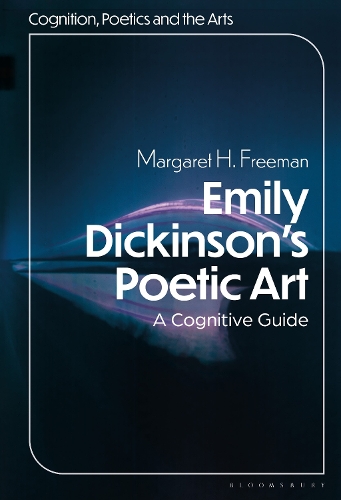
Emily Dickinson's Poetic Art: A Cognitive Reading
(Paperback)
Available Formats
Publishing Details
Emily Dickinson's Poetic Art: A Cognitive Reading
By (Author) Professor Margaret H. Freeman
Series edited by Professor or Dr. Alexander Bergs
Series edited by Professor Margaret H. Freeman
Series edited by Professor Peter Schneck
Bloomsbury Publishing PLC
Bloomsbury Academic USA
27th July 2023
United States
Classifications
Tertiary Education
Non Fiction
Literary theory
Comparative literature
Cognitivism, cognitive theory
811.4
Physical Properties
Paperback
256
Width 152mm, Height 228mm, Spine 20mm
400g
Description
Emily Dickinson's Poetic Art is both an exciting work of literary criticism on a central figure in American literature as well as an invitation for students and researchers to engage with cognitive literary studies. Emily Dickinsons poetry can be challenging and difficult. It paradoxically gives readers a feeling of closeness and intimacy while being puzzling and obscure. Critical interpretations of Dickinson's poems tend to focus on what they mean rather than on what kind of experience they create. A cognitive approach to literary criticism, based on recent cognitive research, helps readers experience and understand the hows and whys of what a poem is saying and doing. These include cognitive linguistic analysis, versification, prosody, cognitive metaphor, schema, blending, and iconicity, all of which explain the sensory, motor, and emotive processes that motivate Dickinsons conceptualizations. By experiencing Dickinsons poetry from a cognitive perspective, readers are able to better understand why we feel so close to the poet and why her poetry endures. Emily Dickinson's Poetic Art: A Cognitive Reading is an important contribution to the study of a major American poet as well as to the vibrant field of cognitive literary studies.
Reviews
Freeman's book is not just an engagingly learned re-introduction to Emily Dickinson but a provocation to consider how contemporary scholarship on embodied cognition may serve as a means of building a more complete understanding of Dickinson's poetic art. * Ryan Cull, Associate Professor of English, New Mexico State University, USA *
Drawing on the insights of cognitive science, Margaret Freeman demonstrates that understanding a poem, even before any attempt at interpretation, is to cognitively experience it, allowing it to reveal itself by what it is saying and doing. Her subtle and meticulous analyses illustrate how those animate organisms work, and they are thus true eye-openers as well as an enormous gain for all lovers of Dickinsons poems, academics and general readers alike. * Gudrun Grabher, Professor Emerita of American Studies, University of Innsbruck, Austria *
Margaret Freeman's new book challenges our preconceptions not only about Emily Dickinson but also about the rapidly growing field of cognitive literary studies. She works scrupulously with all levels of Dickinson's poems, descrying impalpable nuances of poetic language while never losing sight of the final analysis and sense of indefinable but alluring artistic work. Freeman's book applies cognitive science findings and heuristics to literary studies and proffers a holistic view of the ways we read a poem, accompanied by step-by-step comments and striking readings. * Denis Akhapkin, Associate Professor of Languages and Literature, Smolny College, Russia *
Author Bio
Margaret H. Freeman is Co-Director of the Myrifield Institute for Cognition and the Arts, MA, USA. Professor Freeman's past publications include The Poem as Icon: A Study in Aesthetic Cognition (2020).
